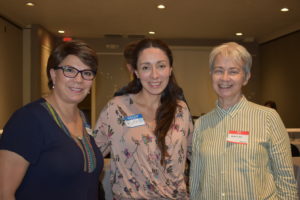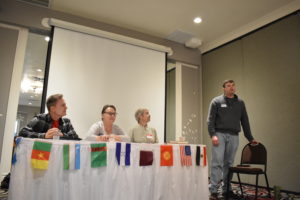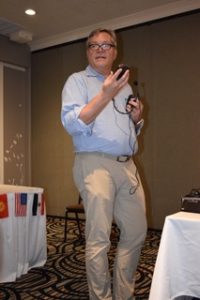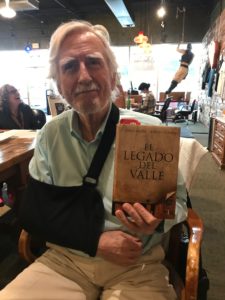AATIA holds two great meetings in May
AATIA members and guests were treated to two great meetings in May, our general meeting on May 11th and the meeting of our Literary Special Interest Group (LitSIG) on May 18th. Many thanks to Jimena Rico Rojas and Kristin Siracusa Fisher for the following recaps.
Turbocharging Translator Output and Portable Equipment for Interpreters – May 11th meeting recap by Jimena Rico Rojas

Esther Diaz, Ruth Carroll, Marian Schwartz
Not even rain could keep us away as we gathered on Saturday, May 11th for our general meeting. After our initial networking and snacks, AATIA President Marco Hanson got the meeting started and introduced our first presentation on “Turbocharging Translator Output.”

Mike Magee, Gisela Greenlee, Marian Schwartz, Tristan Foy
Tristan Foy, our Membership Director, introduced our panelists, Marian Schwartz, Gisela Greenlee, and Mike Magee. These three experienced translators shared their routines and discussed tips for saving time while working as a translator. Routines vary from person to person, and what might work for one, might not work for someone else. It’s important to listen to our own bodies and recognize what our minds tell us regarding productivity and time. A morning person will achieve more by starting early, whereas someone else might do their best while working under pressure.
While the ideal ergonomics will differ from person to person, all our panelists agreed that a supportive chair and a good set-up are key. Mike proposes the 20/20/20 rule to avoid eye strain: every 20 minutes stare for 20 seconds at an object 20 feet away from you. Staying active and varying your pose throughout the day will prevent your body from becoming stiff and your mind stale. The general consensus was that exercise is good for your mind, whether it means jogging or walking or another form of exercise.
CAT tools are another way of saving time. As Marian pointed out, these tools ensure that reiterations and repetitions are traced by the software, which saves on typing time and helps to maintain alignment in vocabulary throughout the text.

Steve Mines
Our second presentation was a hands-on session on interpreting equipment by Steve Mines. Steve is a translator and conference interpreter whose experience spans over three decades. He gave each attendee a receiver, explained some of the technical aspects of the equipment and demonstrated how to listen to one language on one frequency and tune in to a different language by changing the channel.
Steve also discussed the pros and cons of portable equipment versus interpreting booths, noting that the best option will depend on the circumstances. He emphasized that the most important thing when setting up to interpret with portable equipment is to ensure you have direct sound from the speaker. It’s also important to make sure the channels are well tuned so you don’t end up receiving or broadcasting erroneously.
Marco wrapped up the meeting by reminding everyone of our agenda for the summer and our upcoming CAT tool and court interpreting workshops and offering the opportunity to have photos taken for interpreter members interested in getting an AATIA ID badge.
We have enjoyed our meetings this year and can’t wait for the next one. We hope you will join us on July 13th!
Toning Down Translations – May 18th LitSIG meeting recap by Kristin Siracusa Fisher

Tony Beckwith, who showed up for his presentation despite a broken collarbone
LitSIG held its final get-together before the summer break on Saturday, May 18th. Tony Beckwith led the discussion, which centered on some sexist and potentially offensive language that he encountered while translating El Legado del Valle by Spanish authors Jordi Badia and Luisjo Gomez. How Tony handled it (with the authors’ and editor’s consent) sparked a spirited discussion that ranged beyond the particulars of Tony’s experience and touched on the following, among other things:
- Our job or role as translators, beyond the obvious

LitSIG meets at Malvern Books on May 18th
- Censorship vs filtering
- PC speech and the translator
- How does a translator walk the line between representing the source culture and meeting the target audience on their turf?
- How to address cultural differences and the potential for offense or misunderstanding when translating?
- The copy editor’s role in flagging offensive or culturally awkward language
- Foreignization and domestication, and the notion that extreme foreignization impoverishes the English
- Handling non-translatable material
- The pitfall of translation as language lesson (sticking too closely to the source text syntax etc.)
- Why not to talk about translation in terms of “taking liberties” or “being unfaithful”, both of which imply wrongdoing or overstepping boundaries.
There was a lot to talk about there, as you can see!
LitSIG will resume meeting in September. Watch Upcoming Events on our home page for details. Meanwhile, have a lovely summer!



Comments are closed.